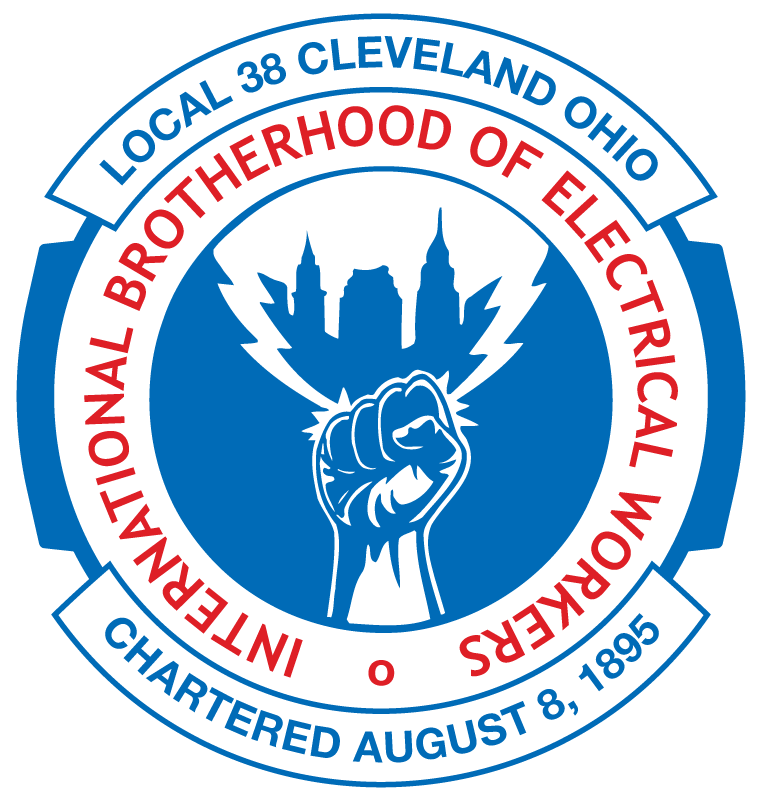WHAT IS A UNION?
A union, such as IBEW Local 38, is an organization of workers, who join together for common purposes such as mutual aid and protection, to engage in concerted activity, for collective bargaining and ultimately to elevate our conditions of life and labor. A union is an organization by which ordinary people do extraordinary things. It is a means by which individual workers, who are vulnerable to the indignities heaped upon them by powerful employers, organize and transform themselves into a powerful and cohesive force to remake their world!
Who runs the Union?
YOU DO!
Our union exists for one and only one major reason – the good of our members. Our union, the IBEW, accomplishes as a unit what we cannot accomplish as individuals. The IBEW cares about you and your family!
Will I have to take a back seat to all of the existing Union members as far as work opportunities?
Not only is this a myth, but it is against the law. Local 38 has a nondiscriminatory job referral procedure, which is bound by the National Labor Relations Act. The person who signs the “Out of Work” list first is given first choice of job referrals. There is no seniority policy and no one has to take a job they do not want.
What about Dues?
Where it may seem to some individuals this is an insurmountable question, and there is no good reason to justify the payment of dues, the answer is really quite simple. Every household, business firm, social or civic organization, church or government body requires financial support to carry out its functions and responsibilities. Similarly, labor unions need financial resources to conduct their affairs. Without adequate financial means, it would be impossible for our international union and our Local unions to represent the members of our organization properly. The many kinds of services labor unions provide require financial resources. Contract negotiating, grievance and arbitration handling, representing the interest of our members before the various levels of government, organizing the unorganized, and many other functions all require sufficient funding if our union is to represent our interests adequately in society as a whole and the work place in particular. Therefore, we, as members, have an obligation to recognize our organization must have adequate financial support if we are going to be effective in representing our interests. As members of the IBEW, we also have a vote in determining the amount of dues the membership pays. At Local 38 the construction membership has voted to pay the following dues and assessments:
Quarterly Dues – $120.00 – $135.00*
General Fund – 2% of Gross
Industry Advancement Fund – 3% of Gross
In return for these dues and assessments, what do the members get? In addition to what is mentioned above, they get a guaranteed hourly pay rate on their checks, three pension plans, full family medical coverage (fully paid for by the contractor), an organizing fund, which betters the livelihood of not just our members, but all the workers in the electrical and Voice/Data/Video industries and last, but not least, they get collective bargaining to help guarantee increased wages and benefits in the future. Union dues are an investment!
* This number fluctuates depending on how many members are sick or have passed away during any given quarter.
Will I only be able to work six months out of the year if I join the IBEW?
This is a common story that is told to keep you from actively investigating the IBEW for yourself. The fact is work is dependent on many factors – the national economy, local economy, interest rates, etc. The demand for electrical workers varies from year to year and month to month. Our members enjoy the benefit of carrying the same insurance and pensions from job to job, whether they are home or traveling. The IBEW is dedicated to establishing uniform standards and wages throughout the industry, so workers do not have to compete over wages, but get and maintain their jobs based on skill and productivity. In the union, you have greater employment opportunities than an individual working non-union. You have full access to union signatories through our referral system and, if union work locally is slow, you can travel to another Local union who has work or you can work for a non-union contractor as a union salt. Through the Union you have the opportunity to work any job!
What is the Agreement?
The contract (or agreement) is the signed document between the electrical contractor or contractors and the Local union, which describes terms and conditions of employment such as the following:
WAGES: Fair rates of pay for each classification of worker, including automatic wage increases, etc.
HOURS: Rest periods, start time, quit time, overtime, shift work, etc.
CONDITIONS: Safety and health, personal rights and treatment.
BENEFITS: Company-paid health and dental insurance, pensions, training, etc. Among the most important benefit features is an orderly system for settling disputes between employees and the company bosses. This is called a grievance procedure and it requires the company to go through successive steps until a satisfactory solution is found to an employee’s problem. Under a written contract, nobody has to guess his rights to seek individual favors from the boss. All things are spelled out for everyone to see and understand.
UNITED WE BARGAIN, DIVIDED WE BEG!!
Now some questions that you need to answer for yourself:
If you are not comfortable with any of your answers to these questions or have any other questions, please do not hesitate to contact me.
Kevin Wilson
Organizer/ Business Representative
IBEW Local 38
216-621-3090
kwilson@ibew38.org
